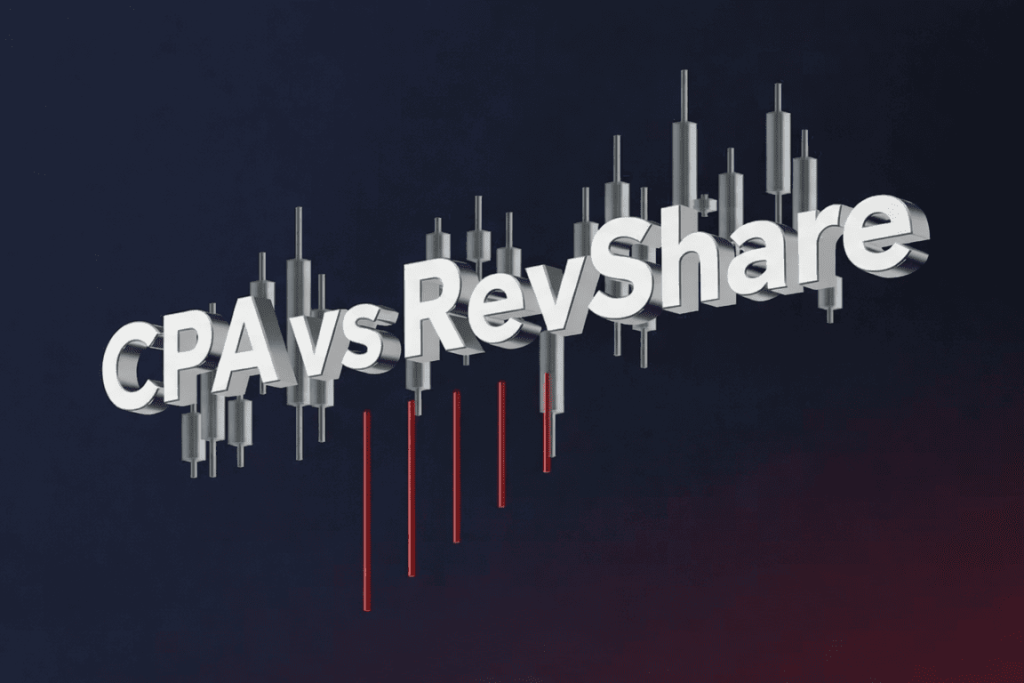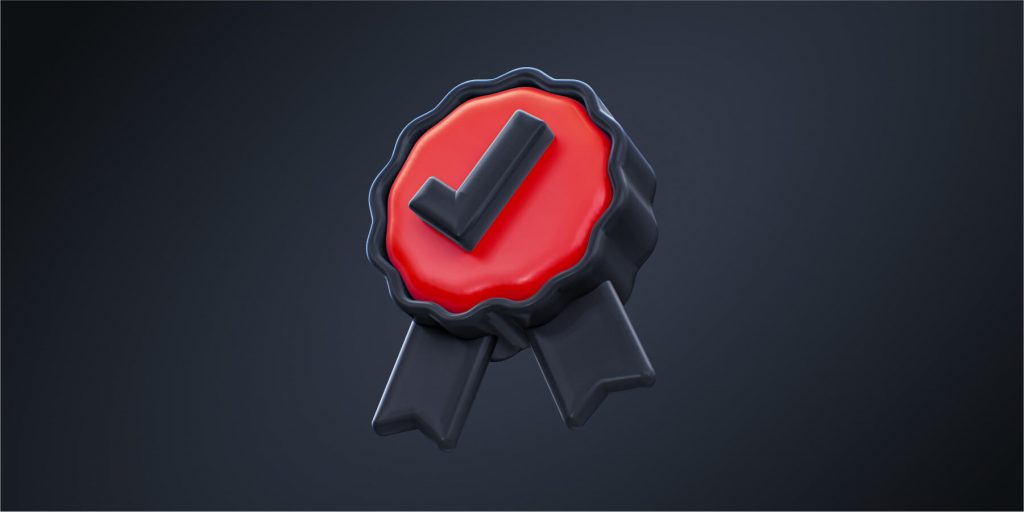
Como obter uma licença de corretagem Forex?
Conteúdo
Para adquirir uma licença de corretagem Forex, você deve estabelecer uma entidade comercial legal, atender aos requisitos de capital, implementar a conformidade com AML/ KYC e preparar uma aplicação estruturada para o regulador da sua jurisdição. Aqui está uma visão geral rápida dos passos principais:
- Forme Sua Entidade Empresarial
- Garantir Capital Necessário
- Construir Procedimentos de Conformidade & Risco
- Selecione o Regulador & Envie a Aplicação
Se você não tem certeza de como obter uma licença de corretagem forex em seu país, recomendamos falar com um advogado ou um consultor financeiro para orientá-lo. Felizmente, este guia abrangente oferece uma visão do processo, seja como um corretor forex aspirante, novo ou existente que ainda não obteve sua licença.
Por que ser um Corretor de Forex Licenciado?
O mercado de forex opera globalmente, com volumes de negociação diários que atingem trilhões de dólares. Embora seja um mercado lucrativo, também traz riscos. É por isso que a regulamentação é crucial e as autoridades regulatórias desempenham um papel importante na garantia da integridade do mercado e na proteção dos interesses dos traders.
You may also like

Essas autoridades agem como protetores ao estabelecer padrões e garantir conformidade dentro de suas regiões. A indústria de forex é supervisionada por órgãos reguladores, como a Comissão de Valores Mobiliários dos EUA (SEC), a Autoridade de Conduta Financeira (FCA) no Reino Unido e a Comissão de Valores Mobiliários de Chipre (CySEC).
Aspectos Positivos da Supervisão Regulatória
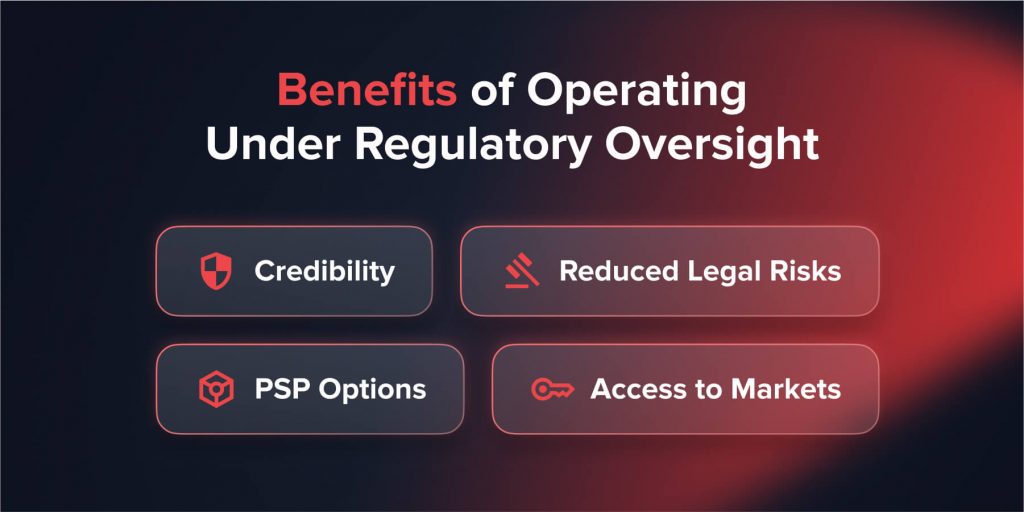
Operar sob supervisão oferece benefícios, que também servem como razões para se tornar um corretor de forex licenciado.
A credibilidade é um benefício da conformidade, pois instila confiança nos traders de que seus investimentos e interesses estão seguros. Essa confiança aumentada pode atrair investidores e traders para sua corretora, levando potencialmente a lucros.
Ter uma licença permite o acesso a diversos provedores de serviços de pagamento, o que significa que você pode oferecer à sua base de clientes mais opções para financiar e retirar da conta. As corretoras não licenciadas podem enfrentar desafios ao trabalhar com PSPs, limitando as opções de pagamento para os clientes.
Além disso, corretores licenciados têm acesso a uma base de clientes e contrapartes maior devido à oferta de pares de moedas como menores, maiores, criptomoedas, derivativos e outros para negociação.
Riscos: Licença vs. Sem Licença
Operar uma corretora de forex sem licenciamento pode parecer um atalho, mas pode ter sérios riscos legais, reputacionais e operacionais. Abaixo está uma comparação entre corretoras licenciadas e não licenciadas:
| Aspecto | Corretora Licenciada | Corretora Não Licenciada |
| Credibilidade | Alta, clientes e parceiros se sentem seguros | Baixa, pode afastar traders e parceiros |
| Acesso a PSPs | Capaz de colaborar com provedores de pagamento de primeira linha | Freqüentemente restrito a PSPs mais arriscados ou offshore |
| Risco de Encerramento | Totalmente em conformidade com as regulamentações financeiras | Normalmente opera em áreas cinzentas legais |
| Proteção ao Cliente | Os fundos dos clientes são mantidos separados, e há obrigações de auditoria e relatórios | A falta de controle pode aumentar a probabilidade de má gestão de fundos |
| Alcance de Mercado | Capaz de comercializar para países sujeitos a regulamentações (UE, | Excluído de mercados desenvolvidos ou regulamentados |
A concessão de licenças não é apenas uma questão de conformidade - é um ponto de entrada para mercados, parceiros e capital. Embora operar sem licença possa parecer mais rápido ou mais barato, isso limitará sua capacidade de escalar seus negócios e aumentará seu risco de exposição legal.
Tipos de Licenças Forex
Diferentes tipos de licenças de corretagem existem; cada uma vem com seu conjunto de requisitos e benefícios. A decisão sobre qual licença você adquirirá impactará muito o sucesso, a direção e o funcionamento do seu negócio.
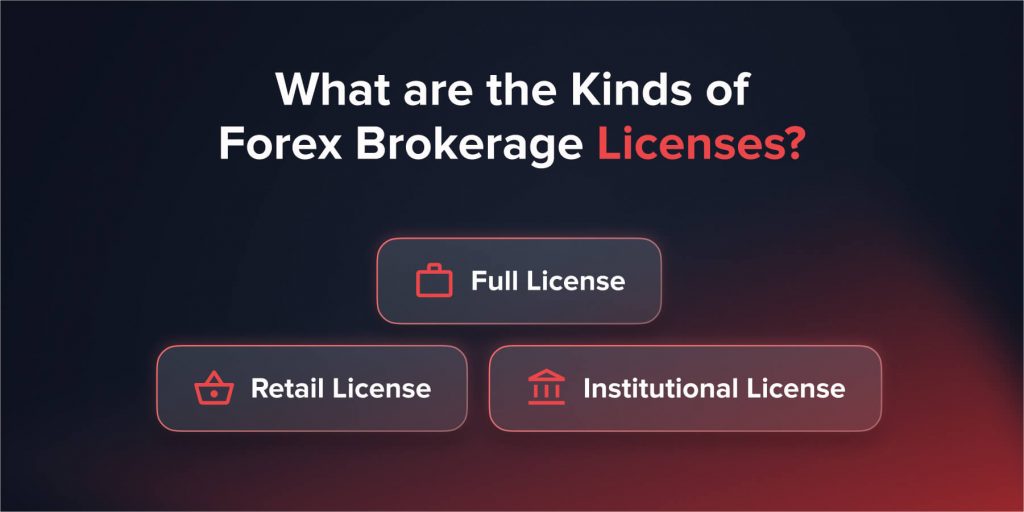
1. Licença Completa
Este tipo de licença permite que você ofereça uma ampla gama de serviços tanto para clientes de varejo quanto para clientes institucionais. No entanto, ela possui condições regulatórias rigorosas e altos limites de capital. Os reguladores costumam exigir uma quantidade substancial de capital para garantir que sua corretora possa lidar com potenciais riscos financeiros. Com uma licença completa, você pode acessar uma ampla base de clientes e potencialmente aumentar suas fontes de receita.
2. Licença de Varejo
Adaptada para corretores que focam em clientes de varejo, esta licença pode ter requisitos de capital mais baixos e medidas de proteção ao investidor aprimoradas, tornando-a mais acessível para startups. É essencial entender que as regulamentações relacionadas aos fundos dos clientes e às divulgações são mais rigorosas nesta categoria. Optar por uma licença é perfeito se o seu objetivo é oferecer serviços de negociação especificamente voltados para investidores individuais.
3. Licença Institucional
Se você se concentrar em atender organizações financeiras como bancos, fundos de hedge ou outras grandes entidades, uma licença de corretora de Forex institucional pode ser a escolha certa. Essa licença também possui um conjunto distinto de requisitos e vantagens. Pode exigir capital substancial e uma infraestrutura tecnológica avançada para lidar com os altos volumes de negociações institucionais. No entanto, o potencial para lucros significativos e parcerias com entidades financeiras estabelecidas pode torná-la uma opção lucrativa.
A escolha do tipo apropriado de licença é uma decisão crítica que deve ser tomada antes da aplicação. Considere seus recursos financeiros, objetivos de negócios e mercado-alvo ao fazer essa escolha.
Revisão de Custos para Iniciar uma Corretora de Forex Licenciada
Iniciar uma corretora de forex licenciada envolve mais do que custos regulatórios – é um investimento em várias camadas. Aqui está uma análise realista dos custos para ajudá-lo a planejar e não ultrapassar seu orçamento.
| Requisito | Custo Aproximado | Descrição |
| Requisito de Capital Regulatório | $1.000.000-$1.000.000+ | Varía com base na jurisdição: Mutius, começando em pouco menos de $1 milhão |
| Formação e Administração de Empresa | $1.000-10.000 | Inclui serviços para nomeados, escritórios registrados |
| Integração Bancária e de Pagamento | $3.000-10.000 | Configuração de entidade comercial, entre outros tópicos |
| Plataforma de Tecnologia (WL ou Personalizada) | $15.000-1.000.000+ | Inclui sistemas de back-office, CRM, plataformas de negociação (como MT5), APIs, personalização |
| Configuração de Compliance (ferramentas KYC/AML) | $2.000-20.000+ | Inclui verificação de identidade, checagens de AML, entre outros |
| Marketing e Desenvolvimento de Marca | $10.000-200.000+ | Publicidade, branding e presença online |
Comece com um modelo enxuto usando tecnologia de marca branca e uma licença offshore para minimizar seu investimento inicial até que você tenha construído confiança e capital, e então expanda. Além disso, optar por plataformas de negociação de marca branca é uma maneira econômica de lançar sua corretora enquanto minimiza o investimento inicial.
Requisitos de Licença de Corretora Forex por País
Escolher onde registrar sua corretora de forex é uma das decisões mais estratégicas que você tomará neste processo. Abaixo está uma comparação dos países mais comumente escolhidos para registrar um corretor de Forex e o tempo de licença, requisito de capital, taxa de imposto e nível de reputação.
| País | Tempo para Licença | Requisito de Capital | Taxa de Imposto Corporativo | Reputação |
| EUA | 6-12 meses | USD 20 milhões + | 21% | Alta |
| Reino Unido | 6-9 meses | GBP 125.000 19% - 730.000 | Alta | |
| Chipre | 3-6 meses | EUR 125.000|12,5% - 730.000 | Média a Alta | |
| Maurício | 2-3 meses | USD 18.000 | 3% | Média |
| Seicheles | 2-3 meses | USD 50.000 | 1,5% | Média |
| Vanuatu | 1-2 meses | USD 50.000 | 0% | Média |
| São Vicente e Granadinas | 2-3 semanas | 0 | 0% | Baixa |
| Ilhas Comores | 2-3 semanas | USD 50.000 | 0% | Baixa |
Escolhendo a Jurisdição Certa para Sua Corretora
Ao decidir sobre a jurisdição para o seu negócio de corretagem, há fatores a considerar e escolhas a serem feitas. Essas decisões impactarão significativamente o sucesso, a direção e as operações diárias do seu negócio. Abaixo, exploramos as jurisdições, destacamos os requisitos, prazos e implicações fiscais associadas à obtenção de uma licença.
São Vicente e Granadinas (SVG)
- Tempo para receber uma licença: 3 semanas
- Capital Registrado: Não é necessário
- Tributação: 0%
Many new entrants and smaller brokerages opt to go with SVG due to the quick turnaround and the fact that there are no capital requirements, allowing the brokerage owners quicker and less expensive market entry. The 0% tax rate is obviously a huge draw, meaning brokerages are able to keep all of their profits, resulting in fantastic ROI numbers.
No entanto, como o ambiente regulatório é mais relaxado, isso pode dificultar a aquisição de clientes, uma vez que o controle regulatório frouxo pode impactar a reputação da corretora. Além disso, isso pode criar desafios adicionais ao tentar lidar com mercados mais regulados.
- Tempo para receber uma licença: 3 meses
- Capital Registrado: $18.000
- Impostos: 3%
Maurício é uma escolha comum entre os corretores que estão concentrados em construir uma forte reputação e conformidade regulatória, uma vez que é bem conhecido por seu sólido sistema jurídico e disposição para seguir critérios mundiais de conformidade. Com uma taxa de imposto relativamente baixa e requisitos de capital, Maurício oferece uma boa combinação para muitos potenciais proprietários de corretoras, proporcionando assim muito espaço para o sucesso.
Seicheles
- Tempo para receber uma licença: 3 meses
- Capital Registrado: $50,000
- Tributação: 1,5%
Frequentemente uma escolha adotada por proprietários de corretoras que buscam entrar em outros mercados—especialmente os africanos e asiáticos—as Seychelles oferecem um rigoroso e abrangente framework legal. Ao garantir que apenas corretoras bem capitalizadas operem sob sua supervisão, a alta demanda de capital—um desafio para corretoras menores—contribui para a estabilidade do mercado.
Vanuatu
- Tempo para receber uma licença: 3 meses
- Capital Registrado: $50,000
- Tributação: 0%
Vanuatu tem a reputação de ser rápido em responder a aplicações, o que o torna atraente para corretoras com um cronograma de início rápido. A tributação de 0% também é extremamente atraente para todos os potenciais proprietários de corretoras. Embora o requisito de capital seja grande, ele contribui para uma maior estabilidade financeira e melhor gestão de riscos.
No entanto, apesar dos muitos fatores positivos e benefícios operacionais, as corretoras que optam por Vanuatu devem dedicar tempo para considerar o impacto em sua reputação, uma vez que os clientes tendem a preferir supervisão regulatória mais reconhecida e rigorosa, como a dos EUA ou do Reino Unido.
Ilhas Comores
- Tempo para receber uma licença: 3 semanas
- Capital Registrado: $50.000
- Tributação: 0%
As Ilhas Comores são semelhantes a SVG, com um tempo de resposta rápido e 0% de tributação. No entanto, um limite de capital mais alto limita essa opção para corretoras menores, mas oferece estabilidade financeira para aqueles que conseguem atender a esses limites. As Ilhas Comores podem ser particularmente úteis para corretoras que buscam participar dos mercados africano e do Oriente Médio.
No entanto, os potenciais proprietários de corretoras devem considerar as desvantagens junto com os aspectos positivos ao escolher as Ilhas Comoro. Embora o ambiente regulatório mais flexível e menos rígido permita uma entrada e acesso mais fáceis ao mercado, isso pode se tornar um obstáculo ao lidar com órgãos regulatórios internacionais mais reconhecidos.
Principais Mercados
Os proprietários de corretoras também fazem bem em considerar os requisitos dos principais players do mercado financeiro, como os EUA, Reino Unido, UE, Austrália e Israel. Todos esses exigem sua própria licença, e deve-se dizer que não é fácil obter uma devido aos ambientes regulatórios extremamente rigorosos. No entanto, com tais regulamentações rigorosas vem o acesso a mercados financeiros bem desenvolvidos que são lucrativos para as corretoras e extremamente atraentes para os traders devido à proteção que recebem das corretoras, bem como às manipulações de mercado.
Como Obter uma Licença de Corretora de Forex?
Obter uma licença de corretora de forex requer preparação cuidadosa e adesão a critérios específicos. Antes do processo de solicitação, alguns requisitos devem ser adequadamente atendidos e realizados corretamente.
1. Estabelecer uma Entidade Empresarial
O primeiro passo é estabelecer uma entidade para a sua empresa de corretagem . Dependendo dos requisitos da sua jurisdição, você deve selecionar uma estrutura, como uma Sociedade de Responsabilidade Limitada (SRL) ou uma corporação. Cada estrutura tem implicações em relação à tributação, responsabilidade e propriedade.
Em seguida, registre sua empresa junto às autoridades competentes. Este processo varia de acordo com a jurisdição, mas normalmente, envolve apenas a submissão de documentos exigidos às autoridades governamentais. A localização e a estrutura da sua empresa serão cruciais no processo de registro.
2. Reunir Capital Necessário
Diferentes jurisdições regulatórias têm diferentes requisitos de capital. Compreender o capital necessário para operar na sua jurisdição selecionada é crucial. Manter reservas de capital é essencial para garantir a estabilidade da sua corretora e atender aos padrões regulatórios. Isso permite que você cubra os depósitos e obrigações dos clientes mesmo em condições de mercado desfavoráveis.
3. Construa Processos de Conformidade Robustos
Após estabelecer a entidade empresarial e possuir as reservas de capital necessárias para a estabilidade, o próximo passo é garantir a incorporação de processos de conformidade robustos para proteger a integridade do seu negócio. Os procedimentos de AML e processos de KYC são processos comuns que sua empresa pode empregar.
4. Protocolos de Gerenciamento de Risco Fortes
Concomitantemente, juntamente com os processos de conformidade adequados, protocolos de gestão de risco robustos também são importantes para mitigar riscos. Conheça os diversos riscos e, em seguida, implemente estratégias de gestão de risco para proteger seu negócio.
Como Solicitar uma Licença de Corretora de Forex?
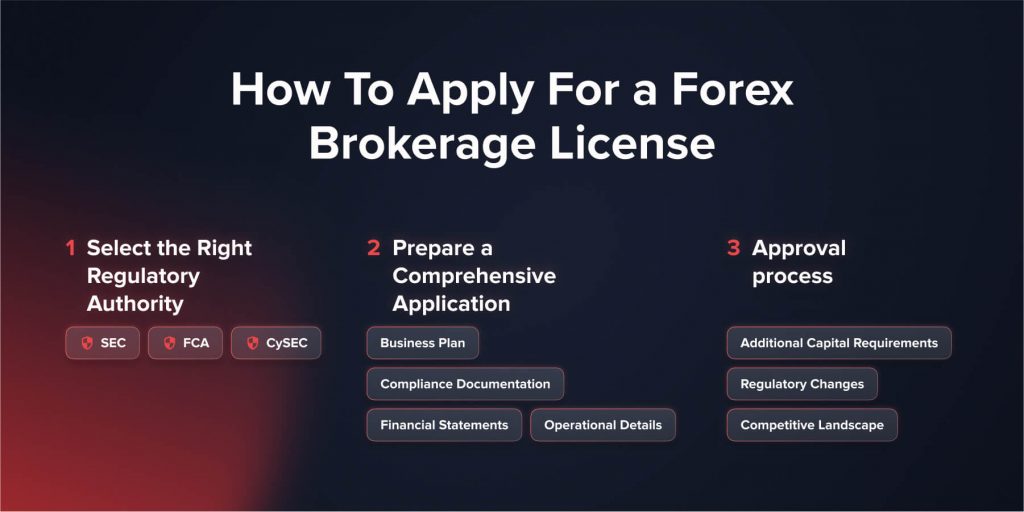
O processo de solicitação de uma licença de corretora de forex pode ser dividido em diferentes seções. Primeiro, você precisa selecionar a autoridade reguladora correta com base em qual autoridade se adapta melhor ao seu negócio e ao seu mercado-alvo. Em seguida, é necessário elaborar uma solicitação abrangente, que completa o processo de solicitação.
1. Selecione a Autoridade Reguladora Certa
Selecionar o corpo é uma decisão crítica que pode impactar como sua corretora de forex opera e é percebida na indústria. A escolha da autoridade pode determinar se suas operações estão limitadas a uma jurisdição ou podem se estender globalmente. Reguladores onshore geralmente têm regulamentações devido ao seu foco na proteção do mercado de varejo, enquanto reguladores offshore tendem a ser mais flexíveis.
Licenças offshore permitem que corretores se envolvam em esforços de marketing e ofereçam razões de alavancagem diferentes de seus homólogos onshore. Alguns exemplos de autoridades de licenciamento offshore incluem Ilhas Marshall, Vanuatu, São Cristóvão e Névis. Portanto, é essencial avaliar fatores como alcance, reputação e requisitos regulatórios antes de finalizar sua seleção.
Portanto, você deve considerar fatores como a jurisdição da autoridade, sua reputação e os requisitos específicos que ela impõe antes de fazer sua seleção. Aqui estão as peculiaridades de algumas autoridades regulatórias onshore notáveis:
- SEC: Renomada por suas regras rigorosas, a SEC é ideal para aqueles interessados em operar dentro do altamente respeitado mercado dos EUA. No entanto, atender aos padrões de conformidade pode ser desafiador.
- FCA: A FCA está baseada no Reino Unido e desfruta de reconhecimento global. Seu framework regulatório é bem estabelecido, tornando-a uma opção atraente.
- CySEC: Chipre é um destino popular para corretores devido à sua adesão à UE. A CySEC oferece um processo de aplicação mais rápido e acesso aos mercados europeus.
2. Prepare uma Aplicação Abrangente
Obter uma licença de corretora de forex requer um extenso processo de solicitação. Esta etapa envolve a utilização de grande parte da base estabelecida durante os preparativos por meio de documentação que geralmente inclui um plano de negócios, documentação de conformidade, demonstrações financeiras e detalhes operacionais.
3. Processo de aprovação
O procedimento de aprovação varia dependendo do órgão. Pode ser demorado e desgastante, portanto, entender como navegá-lo é crucial.
Prepare-se para obstáculos e atrasos que podem envolver solicitações de documentos ou reuniões com reguladores. Alguns desafios e incertezas comuns que podem surgir após a aplicação incluem desafios regulatórios (o que significa que você deve estar pronto para se ajustar a regulamentações em mudança que podem impactar suas operações), requisitos de capital adicionais (os reguladores podem introduzir requisitos de capital, então certifique-se de ter as reservas necessárias) e um cenário competitivo.
É aconselhável buscar orientação de profissionais de conformidade para navegar por esse processo de forma tranquila. Uma vez que você navegue com sucesso pelo processo de aplicação e receba a aprovação, você pode oficialmente se chamar de corretor licenciado.
Erros Comuns ao Solicitar uma Corretora de Forex
Embora uma licença de corretora de forex possa oferecer uma oportunidade de desenvolver um negócio escalável e lucrativo, erros durante o processo de solicitação podem custar tempo, dinheiro, atrasos regulatórios e até mesmo problemas legais. O seguinte descreve os erros mais comuns que novos negociantes de forex cometem e como evitá-los.
1. Cálculo incorreto de despesas de capital e operacionais
Os requisitos de capital regulatório não levam em conta as despesas operacionais contínuas. Não é incomum que os candidatos subestimem seus custos operacionais contínuos, por exemplo, taxas de plataforma, salários, despesas jurídicas e um fundo de reserva para lidar com eventos de risco.
Solução: Complete um plano de negócios completo e um modelo financeiro com pelo menos 12 meses de fluxo de caixa e outras despesas relacionadas à conformidade.
2. Falha em Manter Profissionais de Conformidade
Você não deve enviar a solicitação ao solicitar uma licença, a menos que tenha consultado um assessor jurídico. Deixados por conta própria, os solicitantes irão documentar mal os requisitos, resultando em atrasos desnecessários nas aprovações ou negações completas.
Solução: Engaje-se com um especialista local na jurisdição à qual você está se inscrevendo. Os custos que você incorrer inicialmente serão insignificantes em comparação com os meses que pode levar indo e voltando com um regulador.
3. Selecionando o Tipo de Licença Incorreto
Alguns corretores selecionarão uma licença completa quando sua estratégia de negócios tornaria uma licença de varejo mais apropriada, ou vice-versa. Selecionar a licença incorreta limitará seus serviços ou imporá custos de conformidade desnecessários ao seu negócio.
Solução: Selecione uma licença que complemente sua abordagem comercial, clientes-alvo e volume de transações esperado.
4. Ignorando Obrigações de Conformidade em Andamento
Infelizmente, mesmo após receber uma licença, muitos corretores não manterão a conformidade e, consequentemente, podem receber multas ou perder sua licença. Erros frequentes incluem auditorias perdidas, não atualização das políticas de AML ou treinamento insuficiente dos funcionários.
O que vem a seguir?
Após obter sua licença de corretagem, suas responsabilidades vão além de conseguir a aprovação inicial. Você precisará estabelecer protocolos de conformidade para manter sua licença. Isso pode incluir auditorias regulares, requisitos de relatórios e treinamento de funcionários.
A maioria dos órgãos reguladores exige a apresentação de relatórios para avaliar a conformidade da sua corretora com as regras e a solidez financeira. Deixar de fornecer relatórios dentro do prazo pode levar a sanções ou até mesmo à suspensão da sua licença. É essencial manter a transparência com os órgãos reguladores. Auditorias ou inspeções surpresa podem ser realizadas por essas autoridades para verificar a conformidade da sua corretora com seus padrões. As melhores práticas para estar sempre preparado para esses exames incluem:
- Manter registros organizados de transações financeiras, informações de clientes e esforços de conformidade.
- Coordenar com especialistas legais e de conformidade para abordar quaisquer preocupações levantadas durante as auditorias.
- Realizando auditorias internas para identificar e corrigir proativamente potenciais problemas de conformidade.
Como Prosperar como uma Corretora de Forex Licenciada em um Mercado Competitivo?
Alcançar estabilidade e resiliência operacional é crucial para prosperar neste setor a longo prazo. Isso envolve manter as reservas de capital, adaptar-se às flutuações do mercado e implementar estratégias para rentabilidade e expansão.
A gestão de riscos desempenha um papel na diferenciação como um corretor licenciado dentro de uma indústria impulsionada por incertezas. Implemente estratégias de gestão de riscos para proteger seu capital de mudanças no mercado e ocorrências inesperadas. Abrace os avanços para aprimorar plataformas de negociação, aumentar medidas de segurança e otimizar processos operacionais.
Mantenha-se atualizado sobre as tendências de mercado e as mudanças econômicas que podem influenciar os valores das moedas e os volumes de negociação. Dessa forma, você pode se adaptar rapidamente às dinâmicas de mercado em mudança e se manter à frente da curva. Além disso, fique informado sobre as atualizações e ajuste suas operações de acordo.
Crie estratégias para atrair clientes enquanto retém os existentes por meio da entrega de serviços e suporte. Manter a transparência nos relatórios é fundamental para estabelecer confiança com os clientes e órgãos reguladores. Além disso, certifique-se de educar seus clientes sobre os riscos do mercado e incentive práticas de negociação responsáveis.
Explore oportunidades para diversificar seus serviços oferecendo uma variedade de instrumentos além de apenas pares de moedas. Um corretor de forex licenciado pode se destacar em um mercado priorizando estabilidade, flexibilidade e crescimento sustentável.
Conclusão
Obter uma licença de corretora de forex é um passo crucial para estabelecer um negócio dentro da sempre evolutiva indústria de forex. Ao navegar pelo cenário, atendendo a todas as obrigações e garantindo a conformidade contínua, você pode desenvolver uma corretora confiável que atrai clientes e prospera em meio à concorrência. Certifique-se de que sua corretora autorizada siga as regulamentações necessárias para não apenas cumprir a lei, mas também abrir caminho para a prosperidade e expansão. Comece sua jornada para se tornar um corretor de forex profissional licenciado hoje!
FAQ
Partially. An offshore license (for instance, from Vanuatu or SVG) allows you to provide services in numerous jurisdictions, but not in many regulated markets, which means you will not be able to operate in the US, UK, EU, or Australia. You should always check local regulations before onboarding a client from a specific region.
It varies: Offshore: $0 - $50,000; Mid-tier (CySEC, Mauritius): $125,000+; Tier-1 (U.S., UK): $500,000 to $20 million. Regulators have this requirement to ensure that the broker has the market risk absorption to protect client funds.
Yes, most jurisdictions have requirements for ongoing compliance and yearly renewals, including: Regular audits; Verification of capital reserve; AML/KYC verifications; Regulatory reporting; Failure to maintain these requirements can lead to suspension or revocation of your license.
You do not need a license to provide demo accounts, as no real money is traded. However, if you plan to transition demo users into live traders, you will need to have a valid brokerage license in order to accept deposits and execute trades legally.
It largely depends on the jurisdiction. Here's a rough estimate on the timing: SVG / Comoros Islands: ~3 weeks; Seychelles / Vanuatu / Mauritius: ~3 months; FCA (UK) / CySEC (EU): 3 - 9 months; U.S. (NFA/CFTC): 6 - 12+ months;
Atualizado:
25 de setembro de 2025

